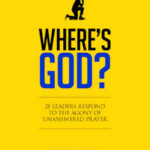We run our website the way we wished the whole internet worked: we provide high quality original content with no ads. We are funded solely by your direct support. Please consider supporting this project.
The Lessons of Job
Breno Peck via Compfight
In his book Benefit of the Doubt, Greg argues that the lessons of the book of Job reassure us that God does not lie behind suffering, but he rather is a trustworthy friend who can handle our doubt and pain. If you’re in the midst of grief or suffering, we hope these words will bring you both comfort and courage.
This inspired epic poem doesn’t explain why some people suffer and others do not, but it offers a singularly profound insight into why we ultimately can’t know the reason why. It’s not that God acts arbitrarily, as Job thought. Nor is it that people get what they deserve, as Job’s friends thought. Rather, good and evil and everything else unfold with apparent randomness because the causes that factor into what comes to pass flow out of a cosmos that is unfathomably vast and complex; a cosmos that includes a heavenly realm that sometimes influences events, as it did Job, but that we are not privy to, and a cosmos that is perpetually under siege by powerful hostile cosmic forces, represented by Leviathan and Behemoth.
More importantly, for our purposes, this inspired poetic drama also provides us with a poignant illustration of what it means to have an “Israelite” faith that honors God. It’s not a faith that is centered on right beliefs and pious language. And it’s certainly not a faith that focuses on feeling secure and worthwhile by convincing ourselves that we’re right. It’s rather a faith that is grounded in authenticity and that is therefore unwilling to sweep questions, doubts, and complaints under a pious rug to avoid the pain of cognitive dissonance. It’s a faith that is not afraid of going to the mat with God. (89-90)
Category: General
Tags: Benefit of the Doubt, Doubt, Pain, Problem of Evil, Suffering, The Book of Job, Theodicy
Related Reading

Are we called to suffering?
What does it mean when we say we’re called to suffering? Does it mean that we should allow ourselves to be victimized or that God approves when we are abused? Here are Greg’s thoughts on this topic.

Approaching Chronic Illness with Wisdom
CNN posted this article on what to say and what not to say when someone you love is suffering with chronic illness. Sometimes our best intentions cause more harm than good, and we need to approach people in pain with a great deal of wisdom and sensitivity. From the article: When people we care about…

Lord Willing? Part 1
Greg sat down with Jessica Kelley recently to talk with her about her book Lord Willing?. We’re posting their conversation in three parts. Today, in part 1, Jessica shares the story of when her son Henry was diagnosed with an aggressive brain tumor at age 4. You can find part 2 of the interview here, and part…

What the Cross Tells Us About God
Whether we’re talking about our relationship with God or with other people, the quality of the relationship can never go beyond the level of trust the relating parties have in each other’s character. We cannot be rightly related to God, therefore, except insofar as we embrace a trustworthy picture of him. To the extent that…

When Prayers Go Unanswered
Recently Frank Viola published a free e-book where 21 Christian leaders responded to the following question: Why is it that God doesn’t often answer the desperate prayers of His people for deliverance, protection, healing, etc.? You can download the free ebook by clicking here. The following excerpt is Greg’s contribution to this book: _____________________ Two very ill children are…

Reflecting on the Conference and Cynicism
We had such a great time this weekend at the Faith, Doubt & the Idol of Certainty conference. People came from all over the United States and it was good to get a chance to connect. We’re more convinced than ever that God is up to something beautiful and real. You’ll be hearing more about…

